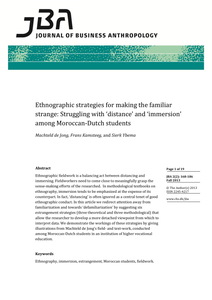The importance of a near-native accent. This talk will discuss whether or not it is important for EFL-teachers to try and achieve a near-native generally accepted accent for their students. The focus will be on the credibility of non-native speakers of English while speaking English in a globalising world, with a heavy or mild foreign accent. These days and in the future more and more non-native speakers of English will communicate with each other in English. For a native speaker it is not that difficult to understand a non-native speaker speaking English with a lot of local or regional phonological interferences. For two non-native speakers of different origin, both speaking English with a mild or heavy accent, it might be more likely that confusion about what is being said occurs because of the foreign accent. Research (Shiri Lev-Ari &, Boaz Keysar, Why don't we believe non-native speakers? The influence of accent on credibility, 2010) proves that a near-native accent adds to the credibility of the speaker. In the Netherland most EFL-teachers were trained to speak English with an RP or GA accent. As soon as they start teaching students in secondary education they accept “World English” and most teachers do not pay a lot of attention to pronunciation mistakes made by their students, as long as they can get the message across. During the talk the audience will be asked how important they consider a near-native accent is, what mistakes they accept and don’t accept and in which way teaching pronunciation is an issue in their lessons. Some sound samples with typical mistakes the Dutch make while speaking English will be presented and discussed to see if the audience consider them to be confusing or not. Then a strategy, using phonetics as a tool, will be presented to help correcting a few typical mistakes. session type : talk (30 minutes) Audience; EFL teachers & teacher trainers
MULTIFILE
It will be hard to find a Dutchmen under 50 years old who is not able to understand and speak English. Dutch pupils in secondary education spend about 4 hours a week studying grammar, reading texts, listening to conversations and giving presentations, all in English and that for four to six years. They even study cultural and historical aspects of the English speaking world. Music, films and playing online-computer games all add to a better understanding of the English language. The quality of most Dutch vowels and consonants are quite close to the quality of many English vowels and consonants. Most of the time an English utterance produced with Dutch vowel and consonant qualities will still be easily understood by native speakers of English. Phonological interference does not automatically make a Dutchman’s English unintelligible. However, why is it so easy to recognise a Dutchman as being Dutch while speaking English? Would it not be worthwhile to try and achieve a near-native accent for our pupils and students?
DOCUMENT

Ethnographic fieldwork is a balancing act between distancing and immersing. Fieldworkers need to come close to meaningfully grasp the sense-making efforts of the researched. In methodological textbooks on ethnography, immersion tends to be emphasized at the expense of its counterpart. In fact, ‘distancing’ is often ignored as a central tenet of good ethnographic conduct. In this article we redirect attention away from familiarization and towards ‘defamiliarization’ by suggesting six estrangement strategies (three theoretical and three methodological) that allow the researcher to develop a more detached viewpoint from which to interpret data. We demonstrate the workings of these strategies by giving illustrations from Machteld de Jong’s field- and text-work, conducted among Moroccan-Dutch students in an institution of higher vocational education.
DOCUMENT
